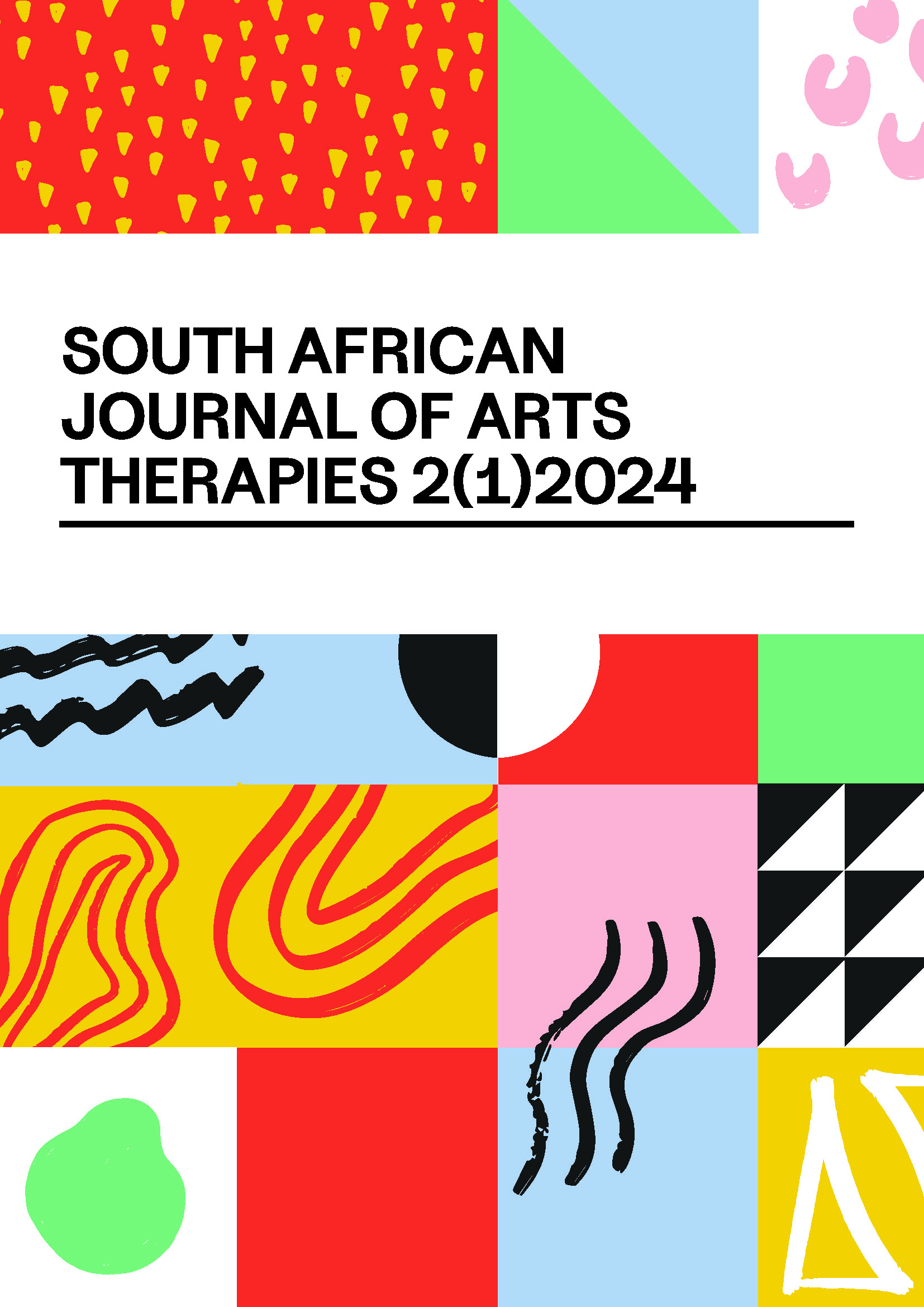Training and research: Art Therapy for social justice. A keynote address
Main Article Content
Keywords
Art therapy, south africa , social justice
Abstract
This presentation is about decoloniality and reflective practice in relation to arts therapy training, research, and social justice. I assert that practising our profession is a great responsibility and attempt to align that practice with the broader conversations happening within the Global South. A few more assertions are made from this initial one: firstly, that reflexivity ensures that we learn from ourselves, our past, and then move forward with an openness to being critical. Secondly, I acknowledge that social justice may not necessarily be achieved on a grand scale with reflexivity alone, therefore, a more systemic approach may be necessary. Lastly, by acknowledging that social justice in South Africa is a continuation of the fight against apartheid and its legacies of violence, educators and students are invited to contribute to decolonising the ways they engage with training and practice materials in the classroom. The presentation concludes with a suggestion made in collaboration with other applied arts practitioners that education should move toward a critical contemplative pedagogy that encourages the transformation of destructive emotions for skilful action.
Article Metrics Graph
References
Berman, H. (2011). The development and practice of art therapy as “community art counselling” in South Africa. Art Therapy Online, 2(2).
Boler, M. (1999). Feeling power: Emotions and education. Routledge.
Cooper, S. & Ratele, K. (2018). The Black Consciousness psychology of Steve Biko. In Global psychologies: Mental health and the Global South, 245-260. https://doi.org/10.1057/978-1-349-95816-0_15
Dalton, S.L. (2018). Art as a therapeutic intervention in a multicultural South African context: Experiences in an under-resourced community clinic. University of Pretoria (doctoral dissertation).
Davis, C. (2021). Sampling poetry, pedagogy, and protest to build methodology: Critical poetic inquiry as culturally relevant method. Qualitative Inquiry, 27(1), 114-124. https://doi.org/10.1177/1077800419884978
Draper-Clarke, L. (2022). Deepening the reflexive in critical praxis: The shift to a contemplative compassionate pedagogy. In H. Barnes, C.B. Carter & W, Nebe (Eds.), Innovative methods for applied drama and theatre practice in African contexts: Drama for life, pp. 134-155. Cambridge Scholars Publishing.
Dunne, P. (2009). Narradrama: A narrative approach to drama therapy. In D.R. Johnson & R. Emunah (Eds.), Current approaches in drama therapy, pp. 172–204. Charles C. Thomas Publisher.
Epstein, B. (2018). Biko on non-white and Black: Improving social reality. In G. Hull (ed.), Debating African philosophy: Perspectives on identity, decolonial ethics and comparative philosophy, pp. 97–116. Routledge. https://doi.org/10.4324/9780429438189-6
Gobodo-Madikizela, P. (2015). Psychological repair: The intersubjective dialogue of remorse and forgiveness in the aftermath of gross human rights violations. Journal of the American Psychoanalytic Association, 63(6), 1085-1123. https://doi.org/10.1177/0003065115615578
Gordon, A.F. (2008). Ghostly matters: Haunting and the sociological imagination. University of Minnesota Press.
Gordon-Roberts, T. (2022). Developing the self-reflective practitioner: Drama therapy and applied theatre: Connections, intersections, methodology and pedagogy. In H. Barnes, C.B. Carter & W, Nebe (Eds.), Innovative methods for applied drama and theatre practice in African contexts: Drama for life, pp. 84-97. Cambridge Scholars Publishing.
Guhrs, T. (2022). Participation, presence and performance: Preparing the teaching artist for theatre for social change interventions. In H. Barnes, C.B. Carter & W. Nebe (Eds.), Innovative methods for applied drama and theatre practice in African contexts: Drama for life, pp. 98-115. Cambridge Scholars Publishing.
Hauptfleisch, T. (1997). Theatre and society in South Africa: Some reflections in a fractured mirror. JL van Schaik.
Honig, B. (1994). Difference, dilemmas, and the politics of home. Social Research, 61(3), 563-597.
Legg, B. (2013). Materiality of place: an investigation into the makers approach to material and process as a reflection of place within northern European contemporary jewellery practice. University of Edinburgh (doctoral dissertation).
Lepere, R. (2021). Song as a register for Black feminist theatre-making aesthetic. Voices: A World Forum for Music Therapy, 21(1), 1–12. https://doi.org/10.15845/voices.v21i1.3155
Meskell, L. & Scheermeyer, C. (2008). Heritage as therapy: Set pieces from the new South Africa. Journal of Material Culture, 13(2), 153–73. https://doi.org/10.1177/1359183508090899
Moonga, N. (2022). Acting from an emergent third space: Exploring contemplative anti-oppressive activism. In The Colonialism and Music Therapy Interlocutors (CAMTI) Collective. Barcelona Publishers.
Moosavi, L. (2023). Turning the decolonial gaze towards ourselves: Decolonising the curriculum and ‘decolonial reflexivity’ in sociology and social theory. Sociology, 57(1), 137-156. https://doi.org/10.1177/00380385221096037
Ngema, L.N., Mbele, O., Moyikwa, N. & Vilakazi, F. (2023). ‘Andizi’: Black women remaking the university in KwaZulu-Natal. Globalisations, 20(2), 238-249. https://doi.org/10.1080/14747731.2022.2080390
Nieves, A.D. (2007). Memories of Africville: Urban renewal, reparations and the Africadian diaspora. In K. Mckittrick & C. Woods (Eds.), Black geographies and the politics of place, Toronto and Cambridge: Between the lines, pp. 82-96. South End Press.
Puwar, N. (2004). Space invaders: Race, gender and bodies out of place. Berg.
Qhobela, L. (2023). Embracing dialogue as breathing: Exploring drama therapy as a tool for facilitating uncomfortable historical conversations. Drama Therapy Review, 9(1), 9-22. https://doi.org/10.1386/dtr_00117_1
Qhobela, L.P. (2023). “We never talk about our work in this way”: A practice-led research exploring the experiences of Applied Drama and Theatre practitioners working in Gauteng and the Western Cape. Stellenbosch University (doctoral dissertation).
Schön, D.A. (1983). The reflective practitioner: How professionals think in action. Basic Books.
Schön, D.A. (2017). The reflective practitioner: How professionals think in action. Routledge. https://doi.org/10.4324/9781315237473
Shapiro, J. (2004). Can poetry be data? Potential relationships between poetry and research. Families, Systems and Health, 22(2), 171–77. https://doi.org/10.1037/1091-7527.22.2.171
Solomon, G. (2006). Development of art therapy in South Africa: Dominant narratives and marginalised stories. Canadian Art Therapy Association Journal, 19(1), 17-32. https://doi.org/10.1080/08322473.2006.11432281
Thompson, J. (2009). Performance affects: Applied theatre and the end of effect. Palgrave Macmillan.
Vogt, I. (2009). “Born in Africa but..”: Women’s poetry of post-apartheid South Africa in English. Ludwig Maximilian University of Munich (doctoral dissertation).
Volkas, A. (2014). Drama therapy in the repair of collective trauma. In N. Sajnani & D.R. Johnson (Eds.), Trauma-informed drama therapy: Transforming Clinics, classrooms and communities, pp. 41–67. Charles C. Thomas.
Woodward, A. (2012). Arts-based practices in regions affected by war. Voices World Forum Music Therapy, 12(2), https://doi.org/10.15845/voices.v12i2.633.


